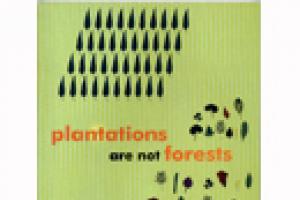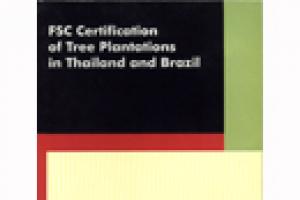During the second half of September this year, the Ecuadorian NGO Acción Ecológica organized a national meeting in Quito on the subject of “Plantations are not forests.” On 20 and 21 September, approximately 40 organizations representing Ecuadorian Indigenous movements, peasants, people of Afro-Ecuadorian descent, NGOs and parliamentarians, together with representatives from Brazil, Chile and Uruguay analysed the issue of plantations and exchanged experiences.
Large-Scale Tree Plantations
Industrial tree plantations are large-scale, intensively managed, even-aged monocultures, involving vast areas of fertile land under the control of plantation companies. Management of plantations involves the use of huge amounts of water as well as agrochemicals—which harm humans, and plants and animals in the plantations and surrounding areas.
Bulletin articles
17 October 2003
Bulletin articles
17 October 2003
Like so many other countries in the South, Uruguay has been convinced (by FAO, the World Bank and the Japanese International Cooperation Agency, among others) that it should promote large-scale tree plantations. From the start, it was very clear that the objective was to produce sufficient raw material for pulp production and for this reason, fundamentally, the plantation of eucalyptus was promoted.
Bulletin articles
17 October 2003
My family's individual struggle and victimisation is typical of what is happening across the populated and high-rainfall areas of rural Australia. In 1984 we moved to North West Tasmania and chose a relatively isolated area to live --one that was away from farms that used chemicals and where the stands of native bush were extensive and beautiful.
Publications
9 October 2003
This book gathers a selection of articles published in the monthly electronic bulletin of the World Rainforest Movement (WRM), addressing the issues of plantations and the struggles developed at the local and global levels against them.
Publications
8 August 2003
By the World Rainforest Movement
Concern over the spread of tree monocultures and their certification is at the centre of this book. However, this concern is merely one part of much broader concerns concerning forests, forest peoples’ livelihoods and communities of living things.
Bulletin articles
31 July 2003
Two weeks ago, the WRM and Oilwatch disseminated an open letter to David Kaimowitz, Director of the Center for International Forestry Research (CIFOR), expressing our concern over a CIFOR research paper "which appears to give green credentials to two activities that are at the core of deforestation and forest degradation: oil and mining." (see letter at http://www.wrm.org.uy/deforestation/oil/Cifor.html )
Other information
31 July 2003
Two tiny moths are at the centre of a social and environmental confrontation in New Zealand. In West Auckland, people and the environment are being subjected to aerial spraying with dangerous chemicals to protect pine plantations against the attack of the painted apple moth (Teia anartoides). In South Auckland, eucalyptus plantations are under attack from the gum-leaf skeletoniser (Uraba lugens) and it is yet unknown if chemical control will be used there.
Bulletin articles
31 July 2003
Two plantations managed by Thailand's Forest Industry Organisation (FIO) are currently certified as well managed under the Forest Stewardship Council system (see WRM Bulletins 48 and 64).
Bulletin articles
31 July 2003
Lying to the population is one of the tools most commonly used by governments and forestry companies all over the world to impose the model of large-scale monoculture tree plantations. Chile has wide experience in this type of deception. However, increasingly people are becoming organized to struggle against the unjust government policy which favours the companies and to defend the true Chilean forests.
Other information
31 July 2003
It sometimes takes many little pieces to recognize the full picture. In the case of the continued debate about the benefits or otherwise of carbon sinks projects linked to the Kyoto Protocol's Clean Development Mechanism (CDM), many still like to envisage it as the long-sought-for funding source for community-driven, small scale forest restoration projects.
Other information
31 July 2003
What's wrong with a company pursuing a green seal for 'sustainable forest management' and a climate-friendly credit for planting trees that help soak up carbon from the atmosphere? Potentially a lot, especially when both of these claims are rather dubious, as the WRM Bulletin coverage on the Brazilian company Plantar S/A indicates. And even more problematic if a company, when faced with criticism about its carbon sinks project, resorts to such tactics as the distortion of facts to discredit its critics.
Other information
30 June 2003
The colonial period of South African history has left a mindset that encourages the exploitation of anything that can be dug out of the ground and shipped off to feed the rapacious appetites of first world industries and consumers. This is what drove the colonial imperative of England, Portugal, France and Spain in centuries gone by, and although there has been political transformation in previously colonised African countries, the economic forces remain largely unchanged.


